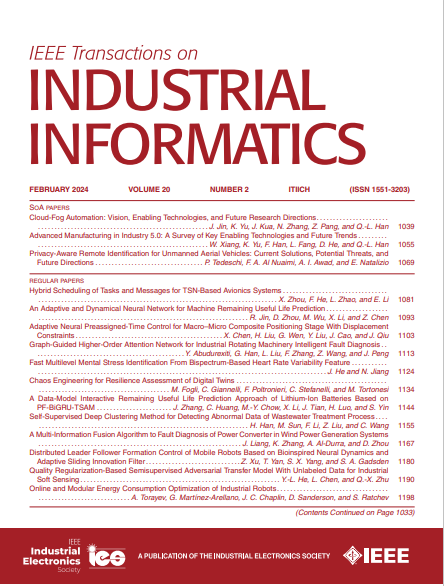孤岛直流微电网固体氧化物燃料电池性能改进的在线学习优化控制算法
IF 9.9
1区 计算机科学
Q1 AUTOMATION & CONTROL SYSTEMS
引用次数: 0
摘要
随着可再生能源的日益普及,固体氧化物燃料电池(SOFCs)为提高微电网供电的可靠性和可持续性提供了一种很有前途的解决方案。提出的方法解决了现有SOFC控制方法中的关键挑战,包括模型依赖、非最优控制策略的使用、对离线训练神经网络(NN)的依赖以及复杂的设计。与基于模型的方法相比,该方法利用神经网络和策略迭代技术来学习系统动力学并逼近最优控制策略,从而消除了模型依赖性。与基于离线学习的方法相比,该方法实现了在线策略评估和神经网络更新,消除了繁琐的离线训练和数据获取过程。与基于在线学习的SOFC控制方法相比,该方法采用定权递归神经网络,避免了递归最小二乘神经网络权值更新过程缓慢甚至不收敛的问题,在不牺牲控制性能的前提下降低了设计复杂度。通过硬件在环测试验证了该方法的优越性。本文章由计算机程序翻译,如有差异,请以英文原文为准。
A Novel Online Learning-Based Optimal Control Algorithm for Enhancing Solid Oxide Fuel Cells Performance in Islanded DC Microgrids
Solid oxide fuel cells (SOFCs) offer a promising solution for enhancing reliability and sustainability in microgrid power supply with the growing penetration of renewable energy sources. The proposed method addresses key challenges in existing SOFC control approaches, including model dependence, usage of nonoptimal control policy, reliance on an offline-trained neural network (NN), and complex design. Compared with model-based methods, this method uses NN and policy iteration technology to learn system dynamics and approximate optimal control policy, thereby eliminating model dependence. Compared with offline learning-based methods, this method achieves online policy evaluation and NN updating to eliminate tedious offline training and data acquisition processes. Compared with the online learning-based SOFC control approaches, this method employs a fixed-weight recurrent NN to avoid slow or even no convergence caused by recursive least squares-based NN weights updating process, reducing design complexity without sacrificing control performance. The superiority of the proposed method is validated through hardware-in-the-loop tests.
求助全文
通过发布文献求助,成功后即可免费获取论文全文。
去求助
来源期刊

IEEE Transactions on Industrial Informatics
工程技术-工程:工业
CiteScore
24.10
自引率
8.90%
发文量
1202
审稿时长
5.1 months
期刊介绍:
The IEEE Transactions on Industrial Informatics is a multidisciplinary journal dedicated to publishing technical papers that connect theory with practical applications of informatics in industrial settings. It focuses on the utilization of information in intelligent, distributed, and agile industrial automation and control systems. The scope includes topics such as knowledge-based and AI-enhanced automation, intelligent computer control systems, flexible and collaborative manufacturing, industrial informatics in software-defined vehicles and robotics, computer vision, industrial cyber-physical and industrial IoT systems, real-time and networked embedded systems, security in industrial processes, industrial communications, systems interoperability, and human-machine interaction.
 求助内容:
求助内容: 应助结果提醒方式:
应助结果提醒方式:


